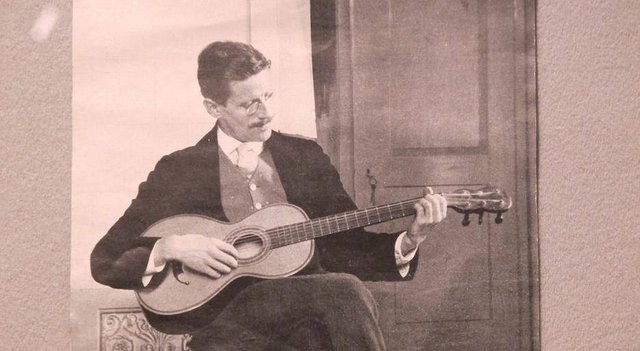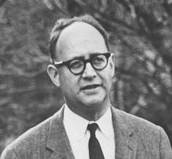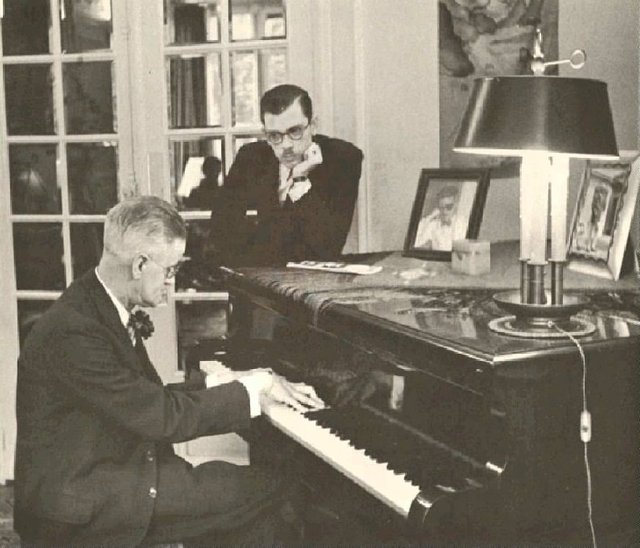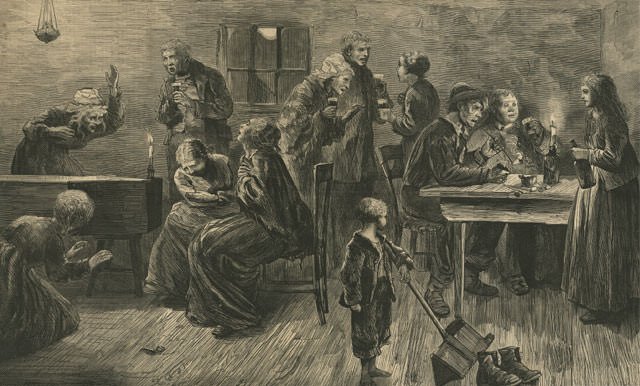Finnegan’s Wake and Joyce

According to his biographer Richard Ellmann, James Joyce was familiar with the ballad Finnegan’s Wake from an early age. Recording the memories of Joyce’s childhood friend and neighbour, Eileen Vance, Ellmann writes:
But the best memory of all for Eileen Vance was the way the Joyce house filled up with music when May Joyce, her hair so fair that she looked to Eileen like an angel, accompanied John, and the children too sang. Stanislaus had for his specialty Finnegan’s Wake, while James’s principal offering for a time was Houlihan’s Cake. James’s voice was good enough for him to join his parents in singing at an amateur concert at the Bray Boat Club on June 26, 1888, when he was a little more than six. (Ellmann 27)
Is it a coincidence that these two songs, Finnegan’s Wake and Miss Hooligan’s Christmas Cake (as it was known in Ireland), are featured in the description of HCE’s wake in the opening chapter of Finnegans Wake (RFW 004.09-005.40)?

Ellmann also includes a version of the song in his biography, and it is significantly different from the three early versions of the ballad that we have been examining (the Durnal, Bryant-Glover and Poole Versions). The Ellmann Version—to give it a name—comes closer to the lyrics that are usually sung in Ireland today, but it is not necessarily the version Joyce knew. Here it is:
Finnegan’s Wake
Tim Finnegan lived in Walkin Street,
A gentleman Irish mighty odd.
He had a tongue both rich and sweet,
An’ to rise in the world he carried a hod.
Now Tim had a sort of a tipplin’ way,
With the love of the liquor he was born,
An’ to help him on with his work each day,
He’d a drop of the craythur every morn.
Chorus
Whack folthe dah, dance to your partner,
Welt the flure, yer trotters shake,
Wasn’t it the truth I told you,
Lots of fun at Finnegan’s Wake.
One morning Tim was rather full,
His head felt heavy which made him shake,
He fell from the ladder and broke his skull,
So they carried him home his corpse to wake.
They rolled him up in a nice clean sheet,
And laid him out upon the bed,
With a gallon of whiskey at his feet,
And a barrel of porter at his head.
His friends assembled at the wake,
And Mrs. Finnegan called for lunch,
First they brought in tay and cake,
Then pipes, tobacco, and whiskey punch.
Miss Biddy O’Brien began to cry,
“Such a neat clean corpse did you ever see?
Arrah, Tim avourneen, why did you die?”
“Ah, hould your gab,” said Paddy McGee.
Then Biddy O’Connor took up the job,
“Biddy,” says she, “you’re wrong, I’m sure,”
But Biddy gave her a belt in the gob,
And left her sprawling on the floor;
Oh, then the war did soon enrage;
’Twas woman to woman and man to man,
Shillelagh law did all engage,
And a row and a ruction soon began.
Then Micky Maloney raised his head,
When a noggin of whiskey flew at him,
It missed and falling on the bed,
The liquor scattered over Tim;
Bedad, he revives, see how he rises,
And Timothy rising from the bed,
Says, “Whirl your liquor round like blazes,
Thanam o’n dhoul, do ye think I’m dead?”
Glossary
Walkin Street probably a corruption of Walker Street, New York
porter a dark well-hopped beer of which Guinness is the best known variety
hould your gab Shut your trap!
Thanam o’n dhoul Your soul to the devil! Irish: D’anam ’on diabhal!
This is quite close to the Bryant-Glover and Poole Versions. There are numerous minor dissimilarities, of course, but a handful of more significant differences may be noted:
| Ellmann | Bryant-Glover | Poole |
|---|---|---|
| Tim Finnegan lived in Walkin Street | Tim Finigan liv’d in Walker Street | Tim Finigan lived in Walker Street |
| He had a tongue both rich and sweet | He’d a beautiful brogue so rich and sweet | He’d a beautiful brogue, so rich and sweet |
| Whack folthe dah, dance to your partner | Whack, hurrah, dance to your partners | Whack, hurrah! blood and ’ounds, ye sowl ye! |
| With a gallon of whiskey at his feet | With fourteen candles round his feet | With fourteen candles round his feet |
| And a barrel of porter at his head | And a couple of dozen around his head | And a couple of dozen around his head |
| Such a neat clean corpse did you ever see? | Such a purty corpse did ever you see | Sich a purty corpse did ever you see? |
| “Ah, hould your gab,” said Paddy McGee | “Och, none of your gab,” sez Judy Magee | “Och, none o’ yer gab!” sez Judy Magee |
| Then Biddy O’Connor took up the job | Then Peggy O’Connor took up the job | Then Peggy O’Connor took up the job |
| But Biddy gave her a belt in the gob | But Judy then gave her a belt in the gob | But Judy then gave her a belt in the gob |
| Oh, then the war did soon enrage | Each side in war did soon engage | Each side in the war did soon engage |
| Shillelagh law did all engage | Shillelah law was all the rage | Shillalah-law was all the rage |
| And a row and a ruction soon began | And a bloody ruction soon began | And a bloody ruction now began |
| Then Micky Maloney raised his head | Mickey Mulvaney raised his head | Mickey Mulvaney raised his head |
| When a noggin of whiskey flew at him | When a gallon of whiskey flew at him | When a gallon of whiskey flew at him |
| Says, “Whirl your liquor round like blazes | Cries, while he lathered around like blazus | Cries, while he lathered around like blazes |
| Thanam o’n dhoul, do ye think I’m dead? | Bad luck till yer souls d’ye think I’m dead! | Bad luck till yer sowls! d’ye think I’m dead? |
Note how it is Tim who is mighty odd in most versions of the song, but in Poole’s Version the punctuation seems to imply that what is mighty odd is the combination of gentleman and Irishman in the same person! I wonder whether this was the original signification of that mighty odd phrase.
The Ellmann Version is unique in having two mourners called Biddy—a confusing feature that anticipates Finnegans Wake, where both these roles are taken by the schizophrenic Issy.
The candles around Tim are a common feature in the three early versions, and were borrowed from John Brougham’s song The Fine Ould Irish Gintleman of 1845, which was the immediate inspiration for Finigan’s Wake. I do not know who replaced these candles with whiskey and porter, or when, but most of the major changes probably occurred in Ireland, where the American song was adopted and soon came to be regarded as an Irish classic.

Joyce Version
We do not know who wrote the original lyrics of Finigan’s Wake. John F Poole is one of the main suspects and there is no doubt that some of his songs have phrases that are echoed by lines in Tim Finigan’s Wake. In 1864, Poole’s song Mrs. McLaughlin’s Party appeared in Tony Pastor’s New Irish Comic Songster. This song is also mentioned in The Arkansas Traveller’s Songster, which was published in 1863. The first stanza and chorus are worth quoting:
Ould Ireland’s the place for a frolic,
The boys and the girls are frisky;
They never can feel melancholic—
They’re the divils for tippling the whiskey.
For a row or a ruction—oh, murther,
The boys they go in strong and hearty;
Now I’ll tell yez, before I go further,
Of Mrs. McLaughlin’s party.
Chorus
Whoo! it’s welt the flure, Peter O’Dougherty;
Shake your leg, Biddy McCarty;
Dance to your partners, ye divils,
At Mrs. McLaughlin’s party!
Of course, even if John F Poole did write the words of the Poole Version, it does not necessarily follow that this was the earliest version of the ballad. Poole may have simply put his unique stamp on the Durnal Version. Poole regularly rewrote popular works. His most famous song, No Irish Need Apply, may have been based on a song of the same name by Kathleen O’Neil, another immigrant from Dublin who worked with Tony Pastor (Silverman 146).
But what version of the song did Joyce and his brother Stanislaus sing? Of the three early versions that I have recognized, the Poole Version seems to have had the greatest currency at the end of the 19th century. It appeared, for example, in Manus O’Conor’s Irish Come-All-Ye’s of 1901. But I do not think that this was the version Joyce knew. A few pieces of evidence support this conclusion.
In 1957, Patricia Hutchins noted that:
When shown this version [the Poole Version], Stanislaus Joyce said at home the third verse was not considered proper! (Hutchins 214)
This is an interesting detail. In the Durnal Version, the third verse is the one in which the riot breaks out. But in the other three versions, the third verse describes the wake (tay and cake, etc) and Biddy’s keening. Only the last line, in which Biddy is told to shut up, could be considered objectionable. The riot only breaks out in the fourth verse. Did Stanislaus, therefore, sing some variant of the Durnal Version?

In the National Library of Ireland, among the Hans E Jahnke Bequest, there is a typed carbon copy of “Tim Finigan’s Wake”, in what is essentially John F Poole’s version. Joyce added a handwritten note. His spidery script is difficult to decipher, but here is my best guess:
This, of course, is not mine. It is an old wellknown and quite vulgar Irish “comic” song of the 50’s or so which I have used as title.
If I understand this aright, Joyce is not endorsing this particular version of the song. It is interesting to see that he appears to date it to the 1850s or so. Also, he emended the title from Tim Finigan’s Wake to Finigan’s Wake. The former was the official title of the Poole Version. The date of this note is unknown, but if I have correctly transcribed the closing words, in which Joyce reveals that he has borrowed the title of this song, then it must date from after 2 August 1938, when Eugene Jolas correctly guessed the title of Finnegans Wake. Up till then, the book was known to the public only as Work in Progress (Ellmann 708).
The biggest piece of evidence, however, that the Joyce Version of Finnegan’s Wake was not one of the three early versions we have been studying is to be found in the pages of Finnegans Wake itself. Joyce does echo a few lines of the song here and there—though very rarely, which is somewhat surprising—and they do not fit any one version of the song, including the Ellmann Version:
RFW 004.19 tuck up your partinher.
RFW 005.38-40 They laid him brawdawn alanglast bed. With a bockalips of finisky fore his feet. And a barrowload of guenesis hoer his head.
RFW 011.26-27 illigant brogues, so rich in sweat.
RFW 019.23 Anam muck an dhoul! Did ye drink me doornail?
RFW 229.06 your sow to the duble!
RFW 242.31 he daddle a drop of the cradler on delight
RFW 387.14-14 and a dozen and one by one tilly tallows round in ringcampf
RFW 474.12 lovesoftfun at Finnegan’s Wake.
It might be an interesting exercise to try and reconstruct the Joyce Version from these scattered remains. Note, however, that Joyce not only echoes the passage about a gallon of whiskey at his feet but also the earlier versions’ fourteen candles round his feet. He also quotes both Your souls to the devil and Thanum ’on dhoul. Did Joyce consult multiple editions of the song?

The final piece in this jigsaw puzzle is the music of Finnegan’s Wake, a subject to which I shall turn in the next article.
References
- John Brougham, The Fine Ould Irish Gintleman, George P Reed, Boston (1845)
- Terence Patrick Dolan (compiler & editor), A Dictionary of Hiberno-English: The Irish Use of English, Second Edition, Gill and Macmillan, Dublin (2006)
- Patricia Hutchins, James Joyce’s World, Routledge, Abingdon (2016)
- James Joyce, Finnegans Wake, The Viking Press, New York (1958, 1966)
- Tony Pastor, Tony Pastor’s Book of Six Hundred Comic Songs and Speeches, Dick & Fitzgerald, New York (1867)
- Danis Rose, John O’Hanlon, The Restored Finnegans Wake, Penguin Classics, London (2012)
- Jerry Silverman, New York Sings: 400 Years of the Empire State in Song, Excelsior Editions, State University of New York Press, Albany NY (2009)
Image Credits
- James Joyce (Zürich 1915): Ottocaro Weiss (photographer), University at Buffalo Libraries, Copyright Unknown, Fair Use
- Richard Ellmann: Wikipedia, Copyright Unknown, Fair use
- James and Giorgio Joyce (Paris 1939): © Institut Mémoires de l’Édition Contemporaine (IMEC), Gisèle Freund (photographer), Fair Use
- Joyce’s Handwritten Note on Tim Finigan’s Wake: © Zurich James Joyce Foundation, Fair Use
- An Irish Wake: Wikipedia, Irish Wake, Harpers Weekly, 15 March 1873, Public Domain
Useful Resources
- The Traditional Tune Archive
- Finnegan’s Wake, Duke University Libraries, Digital Collections
- Finigans Wake
- Miss Fogarty’s Christmas Cake
- Walker Street
- Joyce Tools
- FWEET
- The James Joyce Scholars’ Collection
- FinnegansWiki
- Annotated Finnegans Wake (with Wakepedia)

amazing post my friend.... @harlotscurse
@upvote & @resteem done
dear @harlotscurse .its really amazing
i like it .
so i just
#Resteem
#Upvote
Amazing History Of Finnegans Wake and Joyce.
dear brother its really amazing i like it so much
great post and informative
Fantastic post friend thanks
I heard the story few days ago about the finnegans wake joyce.